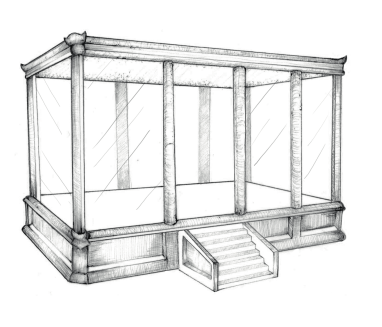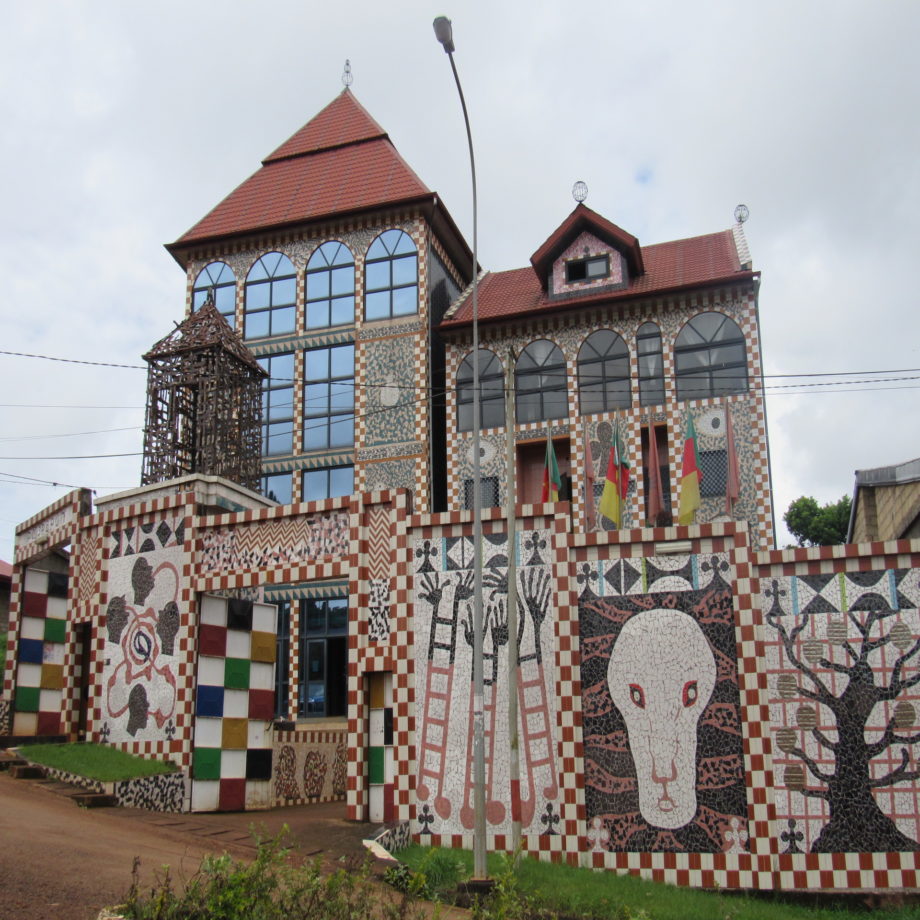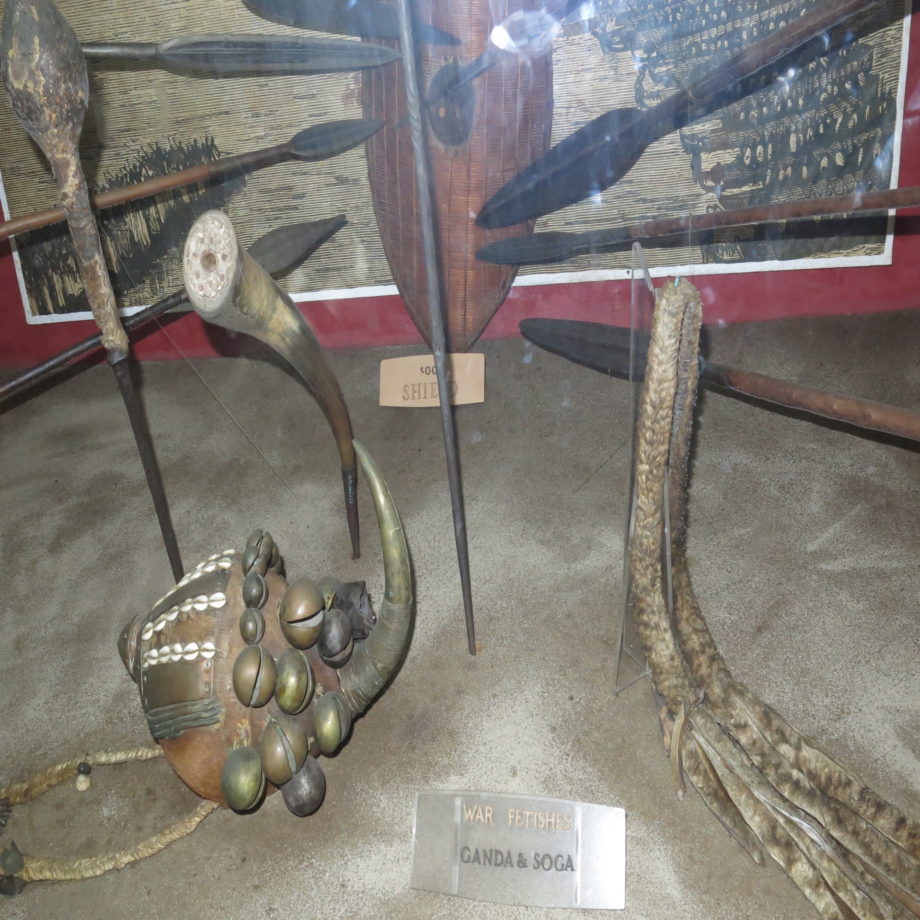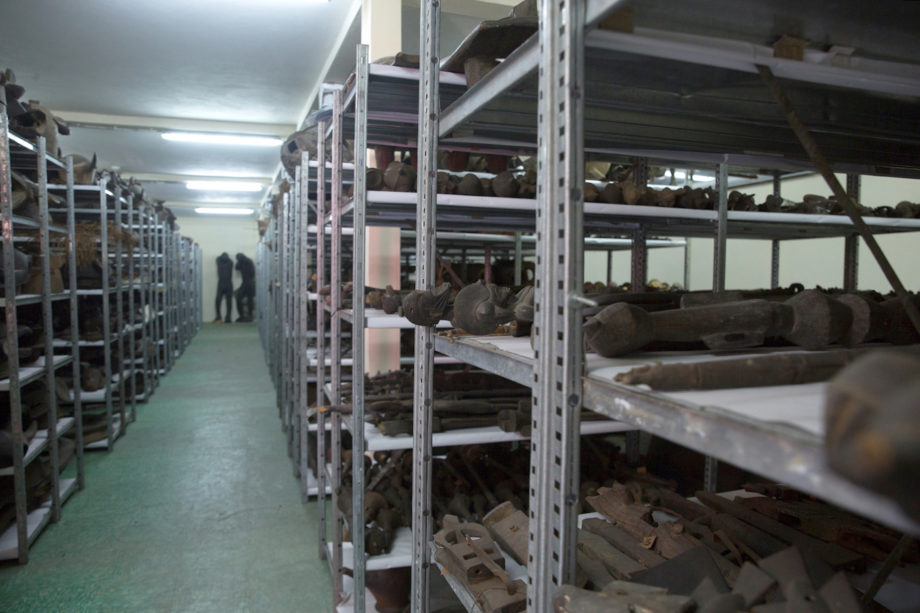Introduction: Transforming the Post/Colonial Museum
DCNtR Debate #3. The Post/Colonial Museum

The Post/Colonial Museum. Zeitschrift für Kulturwissenschaften, 2022. ISBN: 978-3-8376-5397-7. Covergraphik Post-Museen, Anna Habaschy aka Minaechx
Much has been said in recent years about the colonial origin and enduring legacy of former “anthropological” or imperial museums. Programmatic attempts to decolonize them by opening up (Snoep 2020, 2021), worlding (Modest et al. 2019, de Cesari et al. 2020), mobilizing (Oforiatta-Ayim 2015ff), unlearning (Azoulay 2019), repairing (Attia 2014), and restituting (Sarr/Savoy 2018) have multiplied in the museum sector. At the same time, new centers of museum work have emerged, especially on the African continent. Be it in Dakar, Accra, Cape Town, or Nairobi, artists and curators have been working successfully to redefine the museum and to establish new hotspots of an increasingly globalized art scene.[1]
Following the “Museum Collections in Motion” conference in Cologne, emerging and established museum practitioners and researchers from the African continent have come together to share how they, in their respective work, rethink “ethnographic collections” and undo the problematic category of the “ethnographic object”
Contributions by Nelson Abiti (Kampala), Lynn Abrahams and Paul Tichmann (Cape Town), as well as Mary Mbewe (Mbala) are supplemented by a close reading of the exhibition “Beyond Compare. Art from Africa in the Bode-Museum” by Helen Verran who attends to the “long overdue” redesign of museum epistemics. In a second part, Richard Tsogang Fossi (Cameroun) and Bernard Müller (Togo) deal with the historical conditions and surviving memories of colonial collectivism and violence that bring about this sense of urgency that characterizes the ongoing museum debate. A third focus is on the historical trajectories, contemporary challenges, and utopian designs of museum work on the continent. We start this series of posts with two conversations with renown museum experts from the Ivory Coast and from Cameroun/Paris– one with the former director of the Museum of Civilizations, Abidjan and current Director General for the Culture of the Ivory Coast, Dr. Silvie Kassi (with Nanette Snoep and Martin Zillinger), and another conversation with the artist and director of Bandjoun station Barthélémy Toguo (with Anna Brus and Bernard Müller). A third contribution by our colleague Sabrina Moura looks at the history of the Museum of Black Civilisations in Dakar.
All contributions, which will appear on the DCNtR blog over the next weeks, engage with objects and object practices in order to reach out to people. They can be read as part of the struggle to find new ways of “federat[ing] around a conversation” that researchers and artists such as Kader Attia and Felwine Sarr have identified at the actual core of the restitution debate (Attia/Möntmann 2021).
In various ways, instead of adding to the debate on the (im-)possibilities of addressing the colonial specters within collections in Europe, these contributions zoom in on this other phantom of the colonial past, the anthropological museum as it was implemented on the African continent as part of colonial governance and control. Their work testifies that by creating spaces for “epistemic incommensurability” and “ontological happenings”, anthropological museums can turn into what Helen Verran describes as sites of “multiversal relationality”. This changes what objects “are”, how they are categorized or “known”, and what they allow for, once they cease to be merely modern “lumps of matter with particular attributes and qualities” (Verran this debate), that illustrate and characterize ‘ethnographic cases’ (cf. Ingold 2017). With Helen Verran we contend that, to envision a postcolonial museum, it is necessary to describe its colonial modalities, and to search for a postcolonial impulse that consists of and enables “different epistemics and their practicalities to come together to abut and abrade, to interrupt or to offer affordances” in past and present (Verran 2019: n.p.). Such impulses create a museum that is not only transforming, but that may also incite transformation well beyond its walls, as the authors of this debate demonstrate by engaging communities and their object practices in their museum work. We speak of a Post/Colonial museum to mark these and other attempts and ongoing struggles to deal with and ultimately oppose the colonial make-up of former anthropological museums and to interrupt the musealized epistemic, ontological, and social orders they embody.

Bandjoun station, front side with wall painting, Toguo et al. 2022, p.138, photo: Barthélémy Toguo
Object Lessons in Power
While the papers collected for this debate deal with museums on the continent, it would be misleading to speak of an “African museum”. The historical, political, and economic contexts of the various museums, collections, and curatorial practices vary, as do the ways they remain entangled in the bequeathed transnational history of dominance and control on the one hand and of cooperation on the other (cf. Laely/Meyer/Schwere 2018) Still, most of them struggle with colonial legacies and the continuous purification work of modernity that has separated “art” from “ethnographic artefact”, “culture” from “nature”, “subject” from “object”, and “matter” from “spirit”.
Built and run by white colonialists, former anthropological museums on the continent, served to define the Other within and, for a long time, have presented the deprived communities and their material culture in an unchanging ethnographic present (Fabian 1982), classified, ordered, and controlled by the invention of categories such as ethnicity, tribalism, and tradition. By transplanting the modern museum into colonized regions, the administrators and missionaries translated European imperial discourse on the Other into the societies they had to control. As we learned from Tony Bennett (1988), in Europe, the public museum served to provide “objects lessons in power” to “allow people to know rather than be known” and to thus interiorize the regulating regime of modernity and modern statehood. While object lessons in power were pursued by museum practitioners-cum-colonialists on the continent, too, in many ways, the museums they founded remained until very recently spaces of being known and were, for good reasons, perceived as the “museums of the whites” (see Kassi/Snoep/Zillinger, this debate).

Fig. 3: Artifacts labeles as „War Fetishes” at the Ethnography gallery, Uganda Museum. From: Abiti 2022, p. 34, photo: Nelson Adebo Abiti
Museums were part of technologies to turn people into colonial subjects that needed to be “civilized” and adapted to the needs and constraints of extractivist colonial regimes. Europeans implementing the extractivist policies were often aware of the destruction they caused, but saw this as inevitable concomitants of their “civilizing” and “salvaging” mission. As some of the contribution to this debate demonstrate, artifacts were either gathered by the colonizers to become objects of culture, and thus precious for anthropology and the colonial administrators, or they were not only not worth being preserved, but often, in a gesture of brutal demonstration of power, demolished and smashed. With independence, the museums of the colonizers passed into the hands of the postcolonial states. The racist and modernist regimes that structured the archive, the collections, the display, and the architecture of these citadels of colonialism have endured into the present and have long continued to prevent the appropriation of the holdings by the very people whose former subject-objects (Sarr 2019) they hold and whose histories and futures they claim to administer. The Post/Colonial Museum is therefore marked by a painful and paradoxical relation to the social place it inhabits. For the visitors, who often encounter objects from and histories of a past they have been deprived of, the museum experience oscillates between total alienation and intense affinity.
Overcoming Spaces of Death
As the contributions to this debate show, museums are perceived by many as spaces of death for the objects they draw together and for the social functions and practices these objects symbolize and contain. The dynamics of ritual practice and the delegation of authority, the memorizing of events, genealogies, and tradition, and the transmission and reinvention of knowledge constitute material objects as relational objects (cf. Küchler and Carroll 2021) and stand in stark contrast to the frozen and static storage of museum depots and the ethics of preservation that characterize the material culture in Europe’s imperial museums.

Fig. 4. View into the Depot, Museum of Civilizations, Abidjan, from Kassi 2022, p.130, photo: Museum of Civilizations
Much of the current debate on decolonizing the museum centers on how the immobilized and devitalized objects confined within museum walls (Marker/Resnais/Cloquet 1953) can regain an agentive quality and help rebuild the social fabric that has been distorted and disfigured by colonial and postcolonial violence. In their contributions, authors to this debate describe how objects in museums can be known, be enacted, and come to the fore differently from the way they were “known”, preserved, and practiced in the long history of their colonialized, institutionalized, and museumized existence.
Anthropological museums – and by extension anthropology as a discipline – have produced knowledge that continues to be in dire need of decolonization, as critical social and anthropological work has emphasized for decades (see, among many others, Assad 1973, Restrepo and Escobar 2005, Fabian 1983, Ganslmayr and Paczensky 1984, Harms 1984, Leclerc 1972, Owusu 1979, Rabinow 1977). But it is perhaps not by chance that museums – and academic anthropology – are currently both, hot spots of political and social controversies on colonialism and its afterlife, and spaces that provide decolonizing knowledge.
These spaces are created whenever anthropology is pursued in a mode of mutual learning that aims at generating ‘knowledge with’, instead of generating ‘knowledge of’ (Ingold 2017), at establishing ‘partial connections’ (Strathern 2004) rather than universalizing classifications, and at decentering established orders of knowledge rather than legitimizing them. The contribution by the artist Catarina Simão, to be published in the next weeks as part of this debate, unearths histories excluded from the colonial narrative with her multi-layered juxtaposition of photos, documents, and films (Simão 2022). She explores the work of the German-Portuguese anthropologists Dias, who headed an ethnographic mission to the Macondes. While their work is deeply enmeshed in the colonial matrix of applied anthropology of the time, Simão regards the collection generated by their mission as an “original creative act”. Although the photographic inventory fostered concepts such as “authenticity” (sought by the anthropologists) and accounted for “coloniality” (enacted through their work), she uncovers seeds of resistance in the documents of their cooperation with research assistants and translators, and particularly in art practices they encountered. Simão’s experiments with different audience reactions to the sculptures of white Portuguese colonizers demonstrate that, today, the “ethnographic object” cannot be perceived in any way near to the way its originators or its collectors saw it. The responses to the art works are situated in space and time, they differ from setting to setting and are part and parcel of the different ways a historical “truth” is remembered.
As all contributions to this debate testify, there is a long way to go to forge and shape partial connections that lend themselves to new forms of co-operation, in European as much as in African settings. We may be more successful if, along the way, we create spaces of mutual learning that, in the words of the grand dame in the anthropology of learning and change Jean Lave, provide for transforming the relations to our various past and future selves (Lave 2019).
A longer version of this introduction is published in the Zeitschrift für Kulturwissenschaften, issue “The Post/Colonial Museum”, 2022, p 11-28. In order to make the issue “The Post/Colonial Museum” available to a wide readership, specifically on the African continent, we decided to use the long standing collaboration between boasblogs and the Zeitschrift für Kulturwissenschaften to simultaneously publish all contributions in print and online (as DCNtR debate). We thank the editorial boards of both, the Zeitschrift für Kulturwissenschaften and the boasblogs, as much as the publishing house transcript for embarking on this project together. Furthermore, our thanks go to the participants of the conference on Museum Collections in Motion, which was generously supported by the Global South Studies Center, University of Cologne, the research platform “Worlds of Contradictions”, University of Bremen, the Museumsgesellschaft of the Rautenstrauch- Joest- Museum and the Foreign Office of the Federal Republic of Germany. Most of all, we thank the contributors to this debate for four years of exchange, debate and intellectual companionship.
Footnotes
[1]A longer version of this introducton is published in the Zeitschrift für Kulturwissenschafen, issue “The Post/Colonial Museum”, 2022, p.11-28, https://www.transcript-verlag.de/978-3-8376-5397-7/the-post/colonial-museum/
Reference
Abiti Adebo, Nelson (2022): »The Uganda Museum’s Tribal Representation: Colonial Repositories and Community Reconciliation in Uganda« In: Zeitschrift für Kulturwissenschaften 2/2021, 29-46.
Asad, Talal (Ed.) (1973): Anthropology and the Colonial Encounter, London: Ithaca Press.
Attia, Kader (2014): The Repair from Occident to Extra-Occidental Cultures, Berlin: The Green Box.
Attia, Kader/Möntmann, Nina (2021): »The Decolonizing Agency of Repair. Objects, Epistemologies
and the Neoliberal Value System«. In: Museums in Motion Workshop Series,
https://boasblogs.org/dcntr/the-decolonizing-agency-of-repair/ (23.07.2021).
Azoulay, Ariella A. (2019): Potential History. Unlearning Imperialism, London, New York: Verso.
Bennett, Tony (1988): »The Exhibitionary Complex«. In: new formations 4:1, 73–102.
De Cesari, Chiara/Goodwin, Paul/Juneja, Monica/Modest, Wayne/Tiampo, Ming (2020): Trans-Atlantic Platform – Social Innovation (T-AP-SI) Grant – Worlding Public Cultures: The Arts and Social Innovation.
Fabian, Johannes (1983): Time and the Other: How Anthropology Makes its Object, New York: Columbia University Press.
Ganslmayr, Herbert/Paczensky, Gert von (1984): Nofretete will nach Hause. Europa – Schatzhaus der ›Dritten Welt‹, Munich: Bertelsmann Verlag.
Harms, Volker (1984) (Ed.): Andenken an den Kolonialismus. Ausstellungskataloge der Universität Tübingen Nr. 117, Tübingen: Attempto.
Ingold, Tim (2017): »Anthropology contra Ethnography«. In: HAU: Journal of Ethnographic Theory 7:1, 21–26.
Küchler, Susanne/Carroll, Timothy (2021): A Return to the Object. Alfred Gell, Art, and Social Theory, Oxon, New York: Routledge.
Laely, Thomas/Meyer, Mark/Schwere, Raphael (2018): Museum Cooperation between Africa and Europe: A New Field for Museum Studies, Bielefeld: transcript.
Lave, Jean (2019): Learning and Everyday Life: Access, Participation, and Changing Practice, Cambridge: Cambridge University Press.
Leclerc, Gerard (1972): Anthropologie et Colonialisme, Paris: Fayard.
Marker, Chris/Resnais, Alain/Cloquet, Ghislain (1953): Les Statues Meurent Aussi, Essay Movie, France.
Memel-Kassi, Silvie/Snoep, Nanette J./Zillinger, Martin (2022) »The Post/Colonial Museum: Rethinking the Past, Collecting the Present. A Conversation between Dr. Silvie Memel-Kassi, Nanette Snoep and Martin Zillinger.« In: Zeitschrift für Kulturwissenschaften 2/2021, 123-136.
Modest, Wayne/Thomas, Nicholas/Prlić, Doris/Augustat, Claudia (2019): Matters of Belonging.
Ethnographic Museums in a Changing Europe, Leiden: Sidestone Press.
Snoep, Nanette J. (2020): »De la ConServation à la ConVersation. Le Pari de la Carte Blanche«. In: Multitudes 78, 198–202.
Oforiatta-Ayim, Nana (2015ff.): »Mobile Museums-Projects«, https://www.anoghana.org/mobilemuseums (19.08.2021).
Owusu, Maxwell (1979): »Introduction«. In: Colonialism and Change: Essays Presented to Lucy Mair, ed. by Maxwell Owusu, Berlin: De Gruyter, 17–24.
Restrepo, Eduardo/Escobar, Arturo (2005): »›Other Anthropologies and Anthropology Otherwise‹. Steps to a World Anthropologies Framework«. In: Critique of Anthropology 25:2, 99–129.
Rabinow, Paul (1977): Reflections on Fieldwork in Morocco, Chicago: Chicago University Press.
Sarr, Felwine (2019): Afrotopia, trans. by Max Henninger, Berlin: Matthes & Seitz.
Sarr, Felwine/Savoy, Bénédicte (2018): The Restitution of African Cultural Heritage: Toward a New Relational Ethics, http://restitutionreport2018.com/sarr_savoy_en.pdf (19.08. 2021).
Simão, Catarina (2022) »Evidence and Fiction: An Untimely Alliance with the Photography Archive of Margot Dias and Jorge Dias« In: Zeitschrift für Kulturwissenschaften 2/2021, 167-204.
Snoep, Nanette J. (2021): »It’s Yours! 4 Autonomous Spaces«. In: Resist! The Art of Resistance, Exhibition,Rautenstrauch-Joest Museum, Cologne 2021/22, http://rjm-resist.de/en/its- 19.08.2021).
Strathern, Marilyn (2004): Partial Connections (Updated Edition), Oxford: Alta Mira Press.
Verran, Helen (2019): Joke: Papua New Guinea, 1998, unpublished manuscript, n.p.
Verran, Helen (2022): »Trafficking Vague Cosmological Boundaries: Towards Knowing Experiential Relationality in Museum Epistemics« In: Zeitschrift für Kulturwissenschaften 2/2021, 149-166.
Dr. Anna Brus is an art historian at the University of Cologne. In her research and curatorial activities, she works on the history of science of art (history) and ethnology, on exhibition practices of modernity, the entangled history of colonial collections and their echo in the post-migrant present. Most recently, she curated the exhibition “Spectral-White. The Appearance of Colonial Europeans” at HKW, Berlin (2019 – 2020). She is a member of the DCNtR blog collective.
Prof. Dr. Martin Zillinger is Professor for Social and Cultural Anthropology and Speaker of the Center for Media Studies and Modernity Research at the University of Cologne. His recent publications include „The social origin of thought: Durkheim, Mauss and the category project“ (Berghahn 2022, ed. with Johannes F.M. Schick and Mario Schmidt), „Rethinking the Mediterranean“ (Journal of Social and Cultural Anthropology 2020, ed. with Simon Holdermann, Christoph Lange and Michaela Schäuble), and „Iconoclasm and the Restitution Debate“ with Anna Brus and Michi Knecht. In: HAU – Journal of Ethnographic Theory 10 (3): 919-927. He is co-editor of the boasblogs.

































